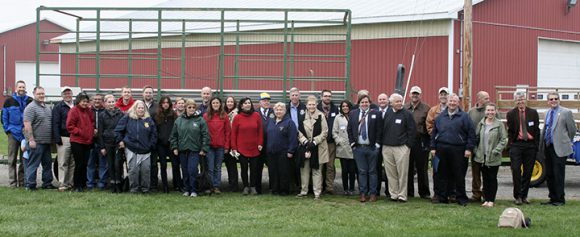
Board of Manager tour attendees at Snyder Research Farm.
The Board of Managers (BOM), an advisory group to the Rutgers New Jersey Agricultural Experiment Station (NJAES), is made up of representatives from New Jersey’s county boards of agriculture. The Board also serves as advocate for the experiment station and provides input to NJAES’ directors on matters concerning the state’s agricultural enterprise. In addition to quarterly board meetings with NJAES directors, the BOM hosts an annual tour of NJAES research facilities to get an in-depth perspective of the agricultural, environmental and nutritional research and outreach conducted by Rutgers faculty, staff and students. The BOM representatives invite fellow county board of agriculture members as well as county freeholders and legislators and state ag officials to attend the tour.
This year, in light of flat funding and increased expenditures for the experiment station, the board expanded the tours to three locations around the state to enhance the opportunity for legislators, legislative aides and freeholders to attend and realize the value of state and county funds in support of the Experiment Station. The “Discovering New Jersey’s Agricultural Experiment Station” half day tours were co-sponsored by the New Jersey Department of Agriculture/State Board of Agriculture, the New Jersey Farm Bureau, the New Jersey Agricultural Society, and the NJAES Board of Managers.
The tours included the Rutgers EcoComplex in Bordentown on March 22; Rutgers NJAES facilities on the George H. Cook Campus in News Brunswick on April 7; and the Rutgers Snyder Research Farm in Pittstown, on April 21. A tour of Rutgers urban outreach activities is planned for the fall.
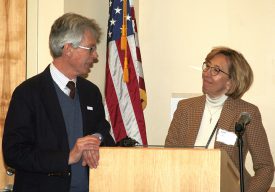
Brad Hillman introduces Serpil Guran at EcoComplex tour.
The tours were well attended by county board of agriculture members, legislators and aides, freeholders, and representatives from related industries. Four out of five members of the Assembly Agriculture and Natural Resources Committee attended the tour at the EcoComplex, and members of the committee were present at all of the tours.
New Jersey Farm Bureau president Ryck Suydam commented, “We were very pleased with this effort among the state’s ag organizations to promote awareness of the experiment station and cooperative extension with our state legislators and many of their support staff. The Rutgers presentations were done very well with a level of sustained enthusiasm and professionalism we share in advocating greater public support for these many important programs.”
Each tour began with a welcome from BOM President Pat Butch and an introduction to the Experiment Station by NJAES director of research, Brad Hillman, and director of extension, Larry Katz. Hillman presented an overview of the Experiment Station. Established in 1880 to conduct and extend research and help residents of the state put this knowledge to work, NJAES helped Rutgers fulfill its mission as the land-grant institution of New Jersey.
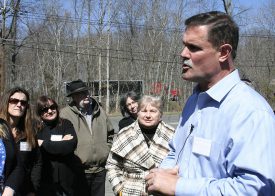
Dave Specca explained the environmental initiatives at the EcoComplex.
Hillman covered the extensive network of centers and institutes that are part of NJAES and are found in all corners of the state. These facilities bring extensive research and outreach support and integration with industries throughout New Jersey. The industries that benefit from NJAES work include agriculture, aquaculture, turfgrass, equine, alternative energy, and food innovation.
Katz expanded on the depth and breadth of NJAES reach throughout the state by introducing the NJAES tagline, “We’ve got the state covered.” In addition to the outlying research centers, each New Jersey county has a presence of a Rutgers Cooperative Extension office, serving constituents in agriculture, home horticulture, environmental and natural resources, family and community health sciences, EFNEP and SNAP-Ed, and 4-H youth development. Funding for the experiment station comes from a conglomerate of federal, state and county dollars, in addition to faculty generating external dollars through grants and contracts, and other sources like royalties, sales or services provided, gifts, and endowments.
EcoComplex Tour
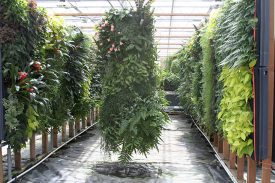
EcoWalls is a start-up company in the EcoComplex greenhouse.
Serpil Guran, director of the EcoComplex, discussed the mission of the Rutgers EcoComplex Clean Energy Innovation Center. The Center conducts research, outreach and education, and is a university based-incubator. It enables partnerships with scientists and entrepreneurs, and provides support services for small start-ups. The Center’s activities concentrate on clean energy generation from biomass and waste-based biomass and other alternative energy generation. The EcoComplex’s integrative work with various groups and agencies, focuses on the need for innovative approaches for New Jersey’s clean water, sustainable food and energy systems.
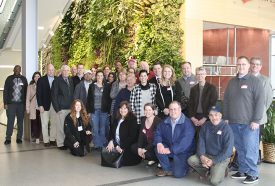
Tour attendees in front of the EcoWall in the Institute of Food, Nutrition, and Health building.
Located adjacent to the Burlington County Resource Recovery Complex, the attendees were given a bus tour of the county solid waste facilities to observe how the EcoComplex interfaces with the county facility, which includes a bioreactor landfill. David Specca, assistant director for Bioenergy Technologies & Controlled Environment Ag led the tour and explained the benefits of a bioreactor landfill, which include faster waste degradation rates, decreased strength of leachate, and more effective capture of landfill gases. Specca took the group through the EcoComplex research and demonstration greenhouse, where the electricity is generated by a turbine fueled by the landfill’s methane gas. Housed in the greenhouse are several start-up companies, including a kosher lettuce producer, hydroponic basil production and EcoWalls, a vertical landscape company.
Rutgers NJAES George H. Cook Campus Tour
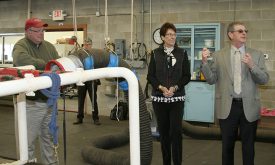
(L-R) Ken McKeever, Karyn Malinowski and Larry Katz at the Equine Science Center
In contrast to the EcoComplex tour’s exposure to state-of-the art facilities and extensive support services and development of environmental and energy technologies, the on-campus tour focused on faculty research that has a direct impact on New Jersey agriculture. Assistant professor Tom Molnar highlighted his research breeding hazelnuts resistant to eastern filbert blight, with large edible nuts. Hazelnut production in New Jersey opens up new markets for a high demand crop that can be grown in marginal locations, with few inputs. The campus tour included a stop at the Rutgers Equine Science Center, where center director Karyn Malinowski and professor Ken McKeever treated the attendees to a demonstration of one of the tools in measuring equine exercise physiology, the treadmill, where a horse demonstrated going from a trot to a gallop on the stationary device. Malinowski and McKeever discussed with the participants the economics of keeping the equine industry in New Jersey.
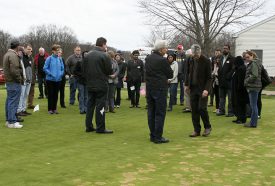
At the Center for Turfgrass Science, attendees got an up close look at a research plot of diseased turf.
The next stop on the tour was the new showcase building on campus, the New Jersey Institute for Food, Nutrition, and Health. Chef Ian Keith led the tour and introduced his healthy eating venue, Harvest. The INFNH incorporates several centers, and a state-of-the-art human performance lab for the Center for Health and Human Performance is located in the building. Classroom space, laboratories and offices are also in the facility.
The final stop on the campus tour was the Center for Turfgrass Science, where professors Bill Meyer, Bruce Clarke and Jim Murphy discussed the research they do on turf disease, maintenance and breeding. The world-renowned turfgrass breeding program brings in royalties to the university.
Snyder Research and Extension Farm Tour
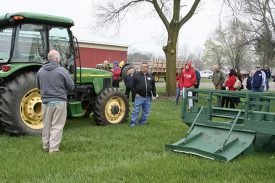
Ed Dager (left), and John Grande (middle) show farm equipment that is used at Snyder Farm.
Snyder Farm is the Rutgers University Center for Sustainable Agriculture. Snyder Farm director John Grande introduced the array of research, outreach and education the farm conducts, including community engagement initiatives like food bank donations of the farm produce to urban and rural communities. Agency representatives were also on hand to give overviews of the USDA IR-4 Project research and USDA Wildlife Services programs at the Snyder Farm and their importance to New Jersey farmers and communities.
A tour of the farm began with an up-close look at high-end equipment used on the farm and for demonstrations, led by farm supervisor Ed Dager. The tour continued with attendees boarding hay wagons for a tour of the agricultural research plots and orchards. The wagons stopped at research plots where county agricultural agents Steve Komar, Bill Bamka, Bob Mickel and Pete Nitzsche discussed a sampling of the research on strawberries, tree fruit, malt barley and hops, catnip, and disease-resistant basil, and turfgrass research for large-lot lawns. Rutgers doctoral
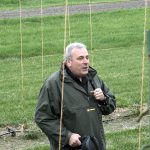
Bill Bamka shows the plot for hops research trials.
candidate in plant biology, Megan Muehlbauer explained the initiative to develop best management practices for growing and analyzing hops, a traditionally risky and expensive crop to grow, and one with growing potential for New Jersey.
Assemblyman Erik Peterson, legislative district 23, who attended the Snyder Farm tour recognized the direct benefits this research provides for New Jersey residents and farmers. Peterson commented, “The research conducted by Snyder Farm provides new cash crops for farmers and helps homeowners maintain their lawns through agricultural and environmental expertise.”
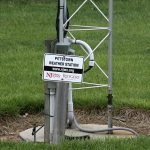
A weather station at Snyder Farm is one of 66 in the network of weather stations around the state.
With this “behind-the-barns” look at the what goes into supporting agriculture in New Jersey through Rutgers outreach, Assemblyman Eric Houghtaling from legislative district 11 in Monmouth County who attended all three tours, commented, “It is amazing what agriculture is, when most people think of ag as an open field with corn or something growing in it, but there is so much more to ag than meets the eye.”

